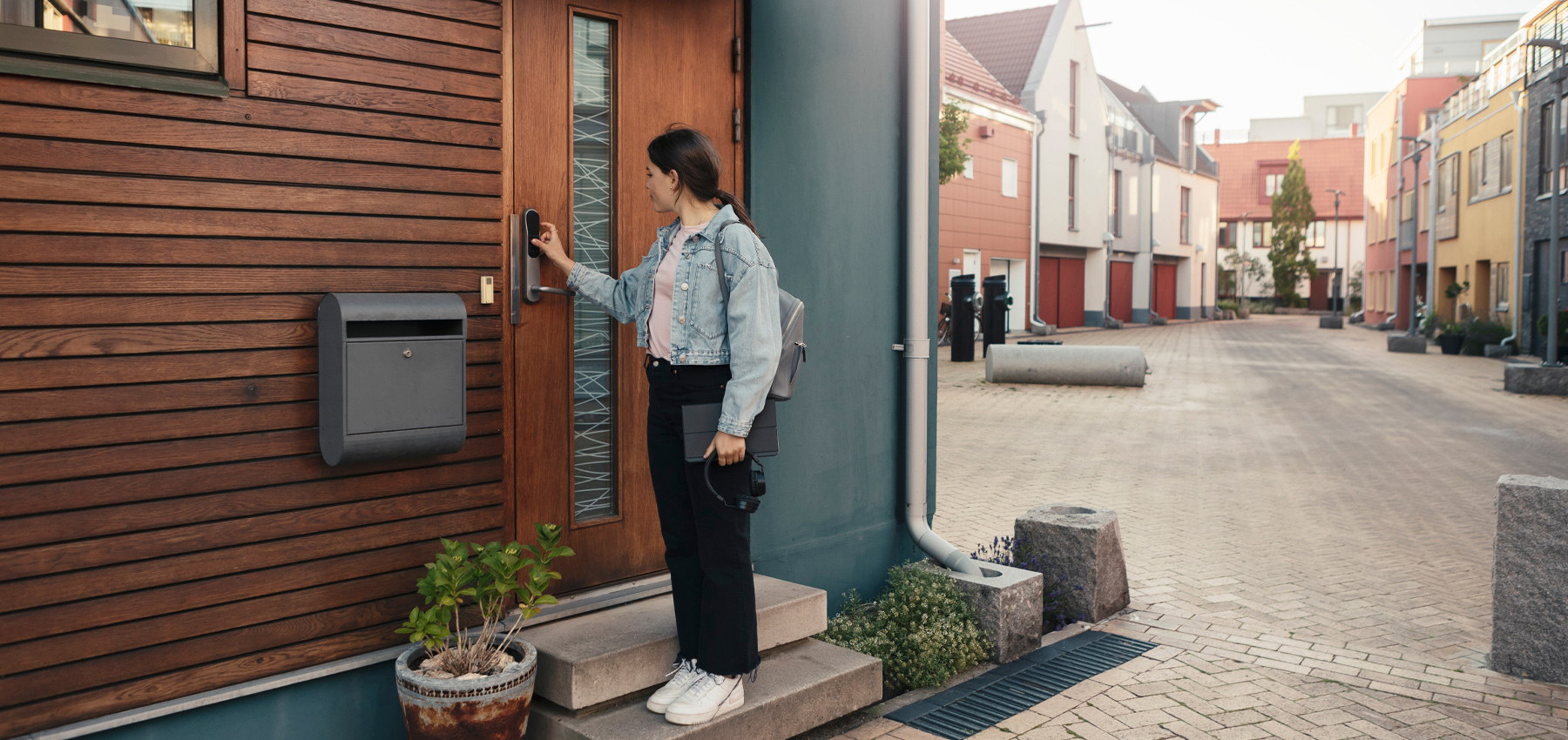For many newcomers, finding accommodation is one of the most important tasks you need to attend to once you arrive in Canada. Having secure and comfortable long-term accommodation gives you a base to settle as you begin your job search, navigate the school system, and find a home. Accommodation-related costs often take up a maximum portion of your monthly expenses. This is why it’s important in the beginning to adhere to your budget and control spending as you look for job opportunities and a more permanent home.
For people who choose to settle in Ontario, here’s what you need to know about finding both short- and long-term accommodation in Toronto and the GTA (Greater Toronto Area).
In this article:
- Types of short-term budget stay options
- How to find permanent, long-term accommodation while on a budget
| Are you moving to Toronto or the GTA and looking for more information on how to rent? Check out these resources – |
Types of short-term budget stay options available in Canada
When you first arrive in Canada, you’ll need somewhere to stay and get settled. If you’re not able to rely on the support of family or friends already living in Toronto, that usually means finding suitable short-term accommodation. This is temporary accommodation for a period of a few weeks to a few months in length, where you don’t have to sign a formal lease to secure a place. Typically, short-term accommodation is cheaper than staying in a hotel. In Toronto and the GTA, there’s plenty of different kinds of short-term housing and accommodation available.
Here are some of the different types of budget accommodations you can expect to find:
1. Serviced apartment: A serviced apartment, also known as an “apartment hotel,” is like having your very own apartment. Often these apartments are available on a short-term basis (from one month onwards) in apartment buildings or are part of a hotel. The advantage of a serviced apartment is the costs are far cheaper than staying in a comparable hotel suite. Different options are available – from one to three bedrooms – and you will have everything you need such as a fully stocked kitchen, bedding and towels, as well as laundry facilities. Depending on the type of building your serviced apartment is in, you may also have access to amenities such as an indoor swimming pool and gym. Individual serviced apartment companies can be searched online, or through sites like Airbnb, Kayak or Trivago.
2. Hostel: Most people think of hostels as only being for the youth, however, that’s no longer true. Hostelling International (HI) Canada operates 51 hostels coast-to-coast across Canada, including four hostels in Ontario – one of which is in downtown Toronto. You can be any age and take advantage of staying in a hostel. You’ll often find private rooms or four-person rooms available, which are ideal if you’re travelling as a couple or a family. Not only are hostels significantly cheaper than staying in a hotel, they’re often located in downtown areas and you’ll have access to a kitchen and living area. Best of all is the opportunity to meet new people from other countries!
3. Shared accommodation: Long-term shared accommodation is another option. This is a great step for giving yourself some stability and sharing an apartment or house with others while finding a place of your own. You should expect to have your own bedroom and share other living areas with the kitchen, living room and bathroom, with other tenants. Advertisements for shared accommodation can be found through classified online ads or through sites like Toronto Roommates.
4. University residence: Another great option for settlers arriving in Canada in the spring and summer months is university and college residence. Generally from May to mid-August when university terms are over, student residences are empty. Rooms are then booked to summer students, travellers, or other visitors through the university’s student residence or housing departments. Accommodation is often clean and modern, and two or three bedroom suites with a kitchen and bathroom is available. Rooms are usually available at a weekly or monthly rate and most residences have 24-hour security available. You’ll need to contact Ontario universities and colleges directly to inquire or make a booking.
| Get more information on how to rent without a credit history in Canada See How to rent an apartment with no credit history or job letter in Canada for tips on how to showcase your reliability as a tenant and where to focus your search. |
Finding permanent, long-term accommodation while on a budget
Most affordable neighbourhoods in Toronto and the GTA for long-term accommodation
With its world-class restaurants, cultural events, and reputation as one of the most multicultural cities in the world, Toronto is a popular choice for newcomers to Canada. Outside of Toronto, the Greater Toronto Area (GTA) is divided into four regional municipalities: Durham, Halton, Peel and York. Currently, the average rent in Toronto for a one-bedroom apartment is approximately $1,770 CAD.
| Familiarize yourself with different neighbourhoods in the Toronto and GTA region Check out –
|
Here are some of the most affordable neighbourhoods for long-term accommodation in Toronto and the GTA:
1. Black Creek
- Location: Situated north west of downtown Toronto in the Jane and Finch area.
- Community: Socially diverse neighbourhood, with a large Jamacian, Italian and Asian population.
- Housing landscape: The neighbourhood consists of detached and semi-detached homes, as well as high-rise apartment buildings.
- Average rent: Approximately $1,630 CAD for a one-bedroom apartment.
- Prominent stay options in the area: Best Western Plus Toronto and the Staybridge Suites Toronto.
2. Scarborough City Centre
- Location: Situated east of Toronto and stretched along Lake Ontario in the south up to Markham in the north.
- Community: Home to the Rouge River and Scarborough Bluffs, also a major business district in the GTA with a diverse cultural community.
- Housing landscape: The neighbourhood consists of suburban housing as well as condominium buildings.
- Average rent: Approximately $1,700 CAD for a one-bedroom apartment.
- Prominent stay options in the area: Super 8 by Wyndham and Best Western Plus Executive Inn.
3. Malton
- Location: Malton is a neighbourhood within Mississauga in the Region of Peel and lies in the northeast of Mississauga, close to Brampton and Toronto’s Lester B. Pearson International Airport.
- Community: Home to home to Italian and Polish communities, as well as a large Sikh community.
- Housing landscape: The neighbourhood consists of subdivisions built largely in the 1950s and ‘60s.
- Average rent: Approximately $1,150 CAD for a one-bedroom apartment.
- Prominent stay options in the area: As Malton is close to the airport, there are a number of hotels nearby, including the Chandni Victoria and Est Hotel.
4. New Toronto
- Location: Situated west of Toronto in South Etobicoke on Lake Ontario.
- Community: A mix of independent stores, cafes and restaurants, as well as some of the best parks in South Etobicoke. Etobicoke is home to European, South Asian and Black communities.
- Housing landscape: Charming detached homes built in the 1920s to the ‘50s, as well as newer townhouses and condominium buildings.
- Average rent: Approximately $1,595 CAD for a one-bedroom apartment.
- Prominent stay options in the area: Hotels include Canada’s Best Value Inn Toronto and the Monte Carlos Inns Toronto West Suites.
5. East York
- Location: Northeast of the Don Valley Parkway and Danforth Avenue.
- Community: Originally British, but now home to communities from India, Pakistan, Jamaica, Philippines, Sri Lanka and China.
- Housing landscape: An abundance of bungalow homes in the area, as well as one-and-a-half and two-story homes and high rise apartment buildings.
- Average rent: Approximately $1,589 CAD for a one-bedroom apartment.
- Prominent stay options in the area: The Toronto Don Valley Hotel & Suites.
6. Downsview
- Location: North of Toronto city centre and close to the 401 Highway.
- Community: Home to the Yorkdale Shopping Centre and close to York University. Downsview has a large Jewish and Italian community.
- Housing landscape: Semi-detached split level homes built in the 1950s and ‘60s, as well as apartment buildings.
- Average rent: Approximately $1,600 CAD for a one-bedroom apartment.
- Prominent stay options in the area: The Montecassino Hotel and Event Centre.
7. Whitby
- Location: Lies east of Toronto in the Region of Durham, along Lake Ontario.
- Community: Historic downtown core filled with stores and restaurants, northern areas more rural. Home to communities from China, the Philippines, the Caribbean and Latin America.
- Housing landscape: Housing largely consists of subdivisions built from the 1990s onwards.
- Average rent: Approximately $1,550 CAD for a one-bedroom apartment.
- Prominent stay options in the area: The Residence Inn by Marriott Whitby and the Holiday Inn Express Whitby Oshawa.
8. Brampton
- Location: Situated in the Region of Peel, close to Toronto’s Lester B. Pearson International Airport.
- Community: One of Canada’s fastest-growing communities and is home to 170 different cultures.
- Housing landscape: Downtown Brampton has old heritage homes built in the late 1800s. Also has newer subdivisions as well as apartment complexes.
- Average rent: Approximately $1,613 CAD for a one-bedroom apartment.
- Prominent stay options in the area: The Residence Inn by Marriott Whitby and the Holiday Inn Express Whitby Oshawa.
Where to search for long-term accommodation in Toronto and the GTA
Now that you’ve got some idea of which neighbourhood you’d like to live in when you first settle in Toronto and the GTA, you’ll need to start finding the right long-term accommodation for you and perhaps your family. Here is where and how to look:
Online
There’s a wide selection of online sites designed to help you find long-term accommodation in Toronto. Here are some of the most popular ones you can use in your search:
- Airbnb: When it comes to finding long-term accommodation, Airbnb has plenty of options available. You can search in the exact neighbourhood you’d like to live, adjust the length of your stay, number of guests including children, even select accommodation that allows pets. You’ve also got access to photos, a list of amenities included and reviews of the property and host to help you make your decision.
- PadMapper: Padmapper is an online search engine designed to make apartment hunting easier. You can use the search tools to select the range of rent you’re willing to pay, number of bedrooms, and if you’re looking for short-term or long-term accommodation. It also has a map feature where you can broaden or narrow your search.
- Kijiji: Kijiji is an online advertising service that Canadians can use to post a classified ad and buy, sell or trade just about anything – from cars to jobs to accommodation. Anyone offering long-term accommodation can post an ad privately. The site includes information on utilities, as well as how long an ad has been listed for. As well as being the most popular online classified site in Canada, it’s also a great resource for researching the rental market and discovering what’s currently available. Sadly, scams happen to people when they rent through a classified online ad. To protect yourself, do not make any payments before you or someone else has inspected the property. Alternatively, they may try to organize a transaction that isn’t face-to-face. Kijiji has put together some helpful guidelines when it comes to avoiding rental scams and how you can protect yourself during COVID-19.
- Craigslist: Craigslist is a similar site to Kijiji and runs classified ads for housing in various cities in Canada. You can use their site to look for temporary accommodation in Toronto and the GTA, or post your own wanted ad stating what you’re ideally searching for. Like Kijiji, if you’re searching for accommodation online through Craigslist, protect yourself from potential scams by seeing a property before committing to rent it and using a secure cashless payment method.
- Toronto Home Zone: This private Facebook group helps people find short-term and long-term rentals in Toronto and the GTA. Members list upcoming rentals and the group is managed by the non-profit Ontario Tenant Alliance and its volunteers. You’ll need to request to become a member of the group first.
Word of mouth
If you already have family, friends of work colleagues in Toronto and the GTA, then these people are a great resource for finding long-term accommodation. Let them know ahead of arriving in Canada that you’re looking for somewhere to stay and ask them to keep you in mind if they hear of anything. Make use of the network you already have in your new home to help you in your search!
Community services
Many cities and towns have organizations that serve newcomers to Canada. One of the ways they’re able to help settlers is in finding suitable accommodation. Look to see if there’s a service nearby and take advantage of confidential and free advice. A list of newcomer services in Toronto is available on the city website.
Realtors
If you know you’ll be looking for an apartment or home to rent in the near future, it might be worth connecting with a realtor now. Typically, realtors handle rentals, especially when it comes to homes in the GTA, and earn their commission from the landlord. As well as helping you find a home, a realtor may also know of long-term accommodation options, such as a short-term lease or sublet.
Walking around
If there’s a neighbourhood in Toronto or a suburb of the GTA you have your heart set on living in, then another way to find long-term accommodation is to take a walk around the neighbourhood. You may find notices for shared accommodation or an apartment coming up for rent in the local coffee shop or on a sign outside an apartment building.
Tips to find budget accommodation in Toronto and the GTA
Finding a place to live in Toronto is one thing, finding long-term accommodation that fits your budget is another. Here are a few things to help you:
1. Negotiate
Perhaps you’ve found the perfect long-term accommodation in the right neighbourhood, but it’s outside of your budget. If it’s being rented by the month, ask if they can negotiate on the price for a longer-term stay or for paying in full upfront, if you plan to stay for one month or more. With the effect of COVID-19 on the rental market and decreasing rent prices in major cities in Canada, now is a good time to negotiate. While the answer may be no, there’s nothing lost by asking confidently and respectfully.
2. Search in the late fall or winter
The spring and summer months are popular times for moving in Canada. It’s when university is out or families want to settle prior to kids going back to school in September. Therefore, there’s more competition or you may find your options are more limited to more expensive accommodation. If you can, search later in the fall, during the winter or early spring when demand is low.
3. Consider other expenses
While housing is typically one of the largest expenses in a budget, when it comes to finding the right long-term accommodation in Toronto, consider other expenses as well, such as public transportation. For example, a cheaper rental in the suburbs isn’t as cheap if you’re also paying an additional $360 CAD in transport costs to commute to your job. Factor in other monthly expenses too, including utilities like electricity and gas, which are usually not included in your rent, as well as other expenses such as home internet or parking costs.
Finding the right short- and long-term accommodation is an important first step in moving to another country. Maximize your success by researching the market ahead of time. That way, you’ll be in a better position to hit the ground running as you start your new life in Toronto and the GTA!





